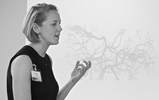It's (maybe) all about relationships
2017-12-06
This blog was written by Pippa Knott, Head of Networks at the Centre for Youth Impact

Working with the Talent Match partnerships has given me an amazing opportunity to reflect on the power of relationships in the context of an employability programme. We’re now focusing on what the Centre’s role might be in strengthening and promoting those that sit at the heart of youth work and other provision for young people.
It’s an issue that has woven through much of our previous work: Robin Bannerjee gave a very well-received presentation at our first event of 2017, discussing approaches to measuring personal development in the context of relationships, and the team at Dartington Social Research Unit (now Policy Lab) wrote for us on the place of relationships in social provision.
Through Talent Match, I’m reminded again of how supportive relationships at their best are hugely powerful – sometimes transformative – and often at the heart of programmes that are ‘working well’. They’re also as complicated as the combination of the individuals who make them up. Many people are happy to ‘feel their way’ through relationships, drawing on past experience and what seems right in the moment. This applies as much to relationships within services and other provision as relationships elsewhere. So devising a framework capturing how to ‘do them well’ is difficult: it can quickly feel an academic, even unhelpful exercise, unlikely to be valued and used by practitioners. Watch this space for how I’m working with the partnerships to try and progres some of these issues! Full findings from the project will be launched in March.
The way in which relationships recur in our work at the Centre also suggests it might not make sense to think of them as a ‘topic’. Instead, they could be a crucial piece in the puzzle of how we can support others to flourish, while also reflecting on ourselves and what we’re bringing to any situation.
Thinking only about the relationship between adult professional or volunteer and young person might also be limiting. I’m also thinking about how we can make the best of the relationships upon which the Centre exists: within the central team, between us and our networks, and across the web of organisations, connections and friendships within which we work. Relationships are a key mechanism for development and support in the overwhelmingly complex systems we live within, and something that any individual can learn about and use to affect change in their own lives, and the lives of others.
What might it look like if we invested in relationships for social good, rather than in organisations or programmes? Are our current methods and frameworks for measuring impact in work with youth people sufficient to take account for the nuances, complexities and potential impact of positive relationships? Do they tell us enough about how relationships can be improved? How can we develop them if so? We’ll be learning from youth work principles and practice [for example, Relationship, Learning and Education; Benefits of Youth Work; Grassroots Youth Work] and the work of the Search Institute, the R-Word, and Lankelly Chase as we develop our approach in this area.
